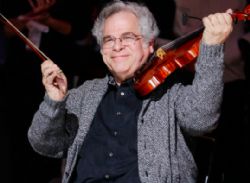|
Symphony
FROM THE NEW WORLD TO THE OLD WORLD
by Peter Lert
Saturday, June 14, 2025
Chamber
MC2 DUO RECITAL CLOSES 222'S SEASON
by Terry McNeill
Saturday, June 14, 2025
Choral and Vocal
CANTIAMO SONOMA'S LUSCIOUS A CAPELLA SINGING IN SEASON ENDING CONCERT
by Pamela Hicks Gailey
Sunday, June 8, 2025
Symphony
SRS SEASON ENDS WITH RESOUNDING TA-TA-TA-BANG
by Terry McNeill
Sunday, June 1, 2025
Symphony
YOUTHFUL VIRTUOSITY ON DISPLAY AT USO'S MAY CONCERTS
by Peter Lert
Saturday, May 17, 2025
Symphony
MYSTICAL PLANETS AND LIVELY GERSHWIN ORTIZ AT FINAL SRS CONCERT
by Peter Lert
Sunday, May 4, 2025
Symphony
VSO'S CONCERT MUSIC OF TIME, MUSIC OF PLACE
by Peter Lert
Sunday, April 27, 2025
VOCAL ELEGANCE AND FIRE AT THE 222'S RECITAL APRIL 26
by Pamela Hicks Gailey
Saturday, April 26, 2025
CANTIAMO SONOMA SINGS AN INSPIRED GOOD FRIDAY MOZART REQUIEM CONCERT
by Pamela Hicks Gailey
Friday, April 18, 2025
DRAMATIC SHOSTAKOVICH SYMPHONY CLOSES PHILHARMONIC'S 25TH SEASON
by Terry McNeill
Sunday, April 13, 2025
|
 |
 Violinist Itzhak Perlman |
PERLMAN TRIUMPHS IN LOW TEMPERATURE SOLD OUT WEILL HALL RECITAL
by Terry McNeill
Sunday, September 15, 2019
Itzhak Perlman did a rare thing for a classical musician in his Sept. 15 recital – he sold out Weill Hall’s 1,400 seats, with 50 more on stage. Clearly the violinist has an adoring local audience that came to hear him perform with pianist Rohan De Silva in a concert of two substantial sonatas mixed with lightweight fare and jovial commentary from the stage.
In each of his two Weill appearances over six years the artist has performed a conventional and conservative program that was designed more to entertain than to challenge listeners, but the musical entertainment was as usual of a felicitous nature that featured his legendary silvery string sound at the expense of sonic power and thematic projection. This was immediately apparent during the entire first half during Beethoven’s charming E-Flat Major Sonata (Op. 12, No. 3) and the brilliant Franck A Major.
Playing from score throughout Mr. Perlman had an uneasy start in the early Beethoven, with uneven pitch and Mr. De Silva’s piano sound covering the violin line, and that at often half pedal. Clarity emerged in the wonderful adagio and the playing solidified, although the violinist slid quietly into the final note. Most of the thematic interest in the concluding Rondo was carried by Mr. De Silva, though Mr. Perlman found the fast tempo easily agreeable.
Franck’s great Sonata from 1886 should have been the afternoon’s big success, and the violinist charmingly mentioned to the audience that in a backstage discussion with Mr. Franck (he died in 1890!) appreciative clapping should wait until the entire work is played. How was the Franck played? It was a low temperature reading without power at the many places the score seems to demand. Mr. Perlman had a sweet tone at low volume but didn’t project the seminal themes in the allegro. More interesting playing came from the pianist with subtle ritards, inner voices and changing phrases in repetitions. The two dramatic downward drives to bottom bass notes (piano) juxtaposed with high violin notes, the Sonata’s heart, never soared with emotional heat.
Mr. Perlman’s best playing in the Franck came in the Fantasia, where below mezzo forte his tone color gleamed over long sustained notes, though pitch problems again reappeared. Mr. De Silva contributed novel phrasing in this beguiling movement, and the concluding allegretto was played graciously at a judicious tempo.
The jaunty Dvorák G Major Sonatina (Op.100) found Mr. Perlman in his best form, where his restrained playing worked well to highlight the folk melodies and sprightly dances in the four movements. There were evocative flute effects and light lyricism in each part, underscoring the friendly Dvorak harmonies that were inspired by the composer’s American residence. The audience loved the interpretation, as did I.
As in past recitals the violinist and pianist then return to the stage with an array of more sheet music, and Mr. Perlman coquettishly fishes through some, nods to the pianist and mugs the audience with a looks of “well, this might be good” or “hmmm, haven’t see this one before.” This schtick belies the obvious, that the duo knows exactly what they are going to play as announced encores, and have rehearsed each carefully. Admiration from the audience was immediate, and five pieces followed: a baroque work that was nearly a perpetual mobile; Tchaikovsky’s lovely Op. 2 Chanson Sans Perole in the Kreisler arrangement, where the violinist made a pun on the jailhouse word “parole,” and surprisingly his intonation in this short piece was insecure; Prokofiev’s March from the opera “Love for Three Oranges” in the Heifetz arrangement; John Williams’ memorable theme from the movie “Schindler’s List” (a Perlman staple); and finally Wieniawski’s virtuosic A Minor work from the Etudes-Caprices of Op. 18.
Mr. Perlman’s persona and audience rapport were a delight to behold, and a Weill full house (for a classical performer) is quite uncommon. At age 74 the violinist seems content to play repertoire that matches his reserved interpretative goals and impeccable musical taste.
|
